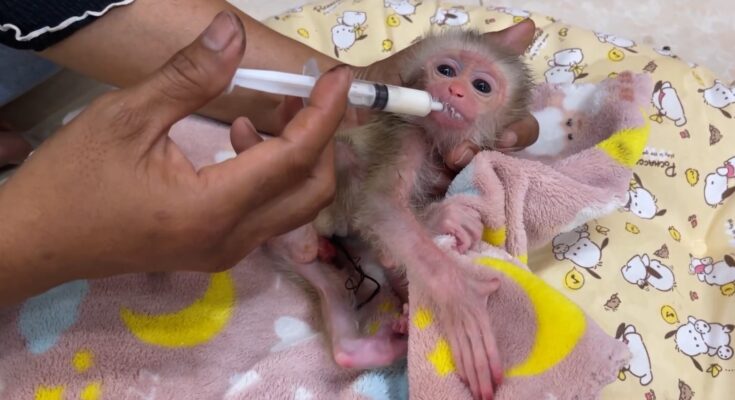Baby monkeys are undeniably adorable, intelligent, and playful. Many animal lovers are fascinated by the idea of raising a baby monkey as part of their family. However, feeding and caring for a monkey at home comes with serious challenges and ethical concerns. Before you consider bringing a baby monkey into your household, it’s essential to understand their dietary needs, behavioral traits, and the responsibilities involved.
What Do Baby Monkeys Eat?
In the wild, baby monkeys rely on their mother’s milk for nourishment during their early weeks. As they grow, their diet consists of:
- Fresh fruits (bananas, apples, grapes, mangoes)
- Vegetables (carrots, sweet potatoes, leafy greens)
- Nuts and seeds
- Protein sources (boiled eggs, insects, or specialized primate food)
- Milk substitutes like goat’s milk or specially formulated primate milk
Feeding a baby monkey requires a strict, nutritious diet to support its growth and health. Unlike human babies, they need a balance of natural foods similar to what they would eat in the wild.
Challenges of Keeping a Baby Monkey at Home
While feeding a baby monkey might seem fun and heartwarming, there are serious challenges:
✅ Nutritional Needs: Monkeys require specific diets that can be costly and difficult to manage. Improper feeding can lead to malnutrition and health issues.
✅ Behavioral Problems: Monkeys are wild animals, not domesticated pets. As they grow, they can become aggressive, territorial, and destructive.
✅ Long-Term Commitment: A monkey can live for 20-40 years! Raising one requires decades of commitment, unlike a typical household pet.
✅ Legal Restrictions: In many countries, owning a monkey is illegal without proper permits. Always check local laws before considering one as a pet.
✅ Health Risks: Monkeys can carry diseases that may be harmful to humans, such as herpes B virus and zoonotic infections.
Can You Fe🐵ed a Baby Monkey? Essential Guide for Proper Care

Baby monkeys are adorable creatures, but feeding them requires knowledge, patience, and responsibility. If you’re considering feeding a baby monkey, whether in the wild or as a pet, you must ensure you provide the right nutrition for its healthy growth. In this guide, we’ll explore everything you need to know about feeding a baby monkey safely and correctly.
Understanding a Baby Monkey’s Diet
Baby monkeys, like human infants, rely on their mother’s milk for essential nutrients during their early weeks. If you’re responsible for feeding one, you need to replicate this diet as closely as possible.
1. Newborn to 3 Months: Milk-Based Diet
- A baby monkey’s primary source of nutrition is milk. If the mother is unavailable, you can use specialized primate milk replacers or goat’s milk, as cow’s milk may be too harsh for their digestive system.
- Feeding frequency: Every 2–3 hours.
- Use a soft nipple bottle to mimic natural nursing.
2. 3 to 6 Months: Gradual Introduction to Soft Foods
- Begin incorporating soft fruits like bananas, papayas, and mangoes.
- Mashed vegetables such as sweet potatoes and carrots can also be added.
- Continue with milk feedings but reduce the frequency as solid foods become a larger part of their diet.
3. 6 Months and Beyond: Transition to Solid Foods
- Introduce a variety of fresh fruits, leafy greens, nuts, and seeds.
- Small portions of cooked rice and boiled eggs can provide additional protein.
- Avoid processed foods, sugary treats, and anything toxic like avocados, chocolate, or onions.
Feeding Tips for a Healthy Baby Monkey
- Hydration is crucial – Provide clean, fresh water at all times.
- Monitor digestion – If you notice diarrhea or constipation, adjust the diet accordingly.
- Avoid human food – Spices, artificial flavors, and fast food can harm a monkey’s health.
- Social feeding – Monkeys learn from their environment, so allowing interaction with other primates (if safe) can help them develop healthy eating habits.
Important Considerations Before Feeding a Baby Monkey
- Legal Restrictions: Keeping or feeding a monkey as a pet is illegal in many countries without proper permits.
- Ethical Concerns: Wild monkeys should ideally be cared for by professionals or wildlife rehabilitation centers.
- Long-Term Commitment: Baby monkeys grow into highly active and social animals that require specialized care.
Conclusion
Feeding a baby monkey is a delicate process that requires proper knowledge and responsibility. If you ever find an abandoned or injured baby monkey, it’s best to contact wildlife experts who can provide the appropriate care. If you’re legally permitted to care for one, always prioritize a natural, balanced diet to support its growth and well-being.


